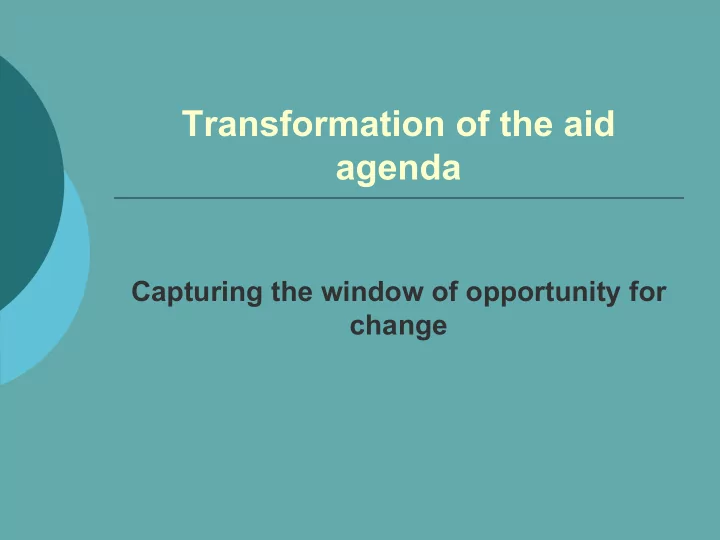

Transformation of the aid agenda Capturing the window of opportunity for change
Why the interest in aid? � Aid has improved the lives of millions of people – proportion of people living in poverty has fallen significantly since 1950 � Aid and aid institutions continue to fuel the poverty and development agenda – financially and intellectually � Private flows are not rationed according to where there is greatest poverty and it’s unpredictable and can not take the place of aid transfers Aid Policy Context I: International 11/09/2007 Partnership Development 2
Why the special interest in aid: recent trends, reasons for optimism & caution? Reasons for serious Reasons for renewed caution optimism � New forms of funding � Monterrey aid compact and adverse selection � MDGs � A consensus among donors limiting options � PRS process for the developing � Budget support nations. � Global funds vs. � Commission on national budget support sustainable dev & PRS processes � Helsinki process � Aid, war on terror & diversion � Global gov initiative � Aid, trade, and inducements Aid Policy Context I: International 11/09/2007 Partnership Development 3
Where do we position ourselves: understanding emerging perspectives � Aid good, can be made better through incremental changes - “rational, technocratic, evolutionary” school – � Aid not very good, could be good through transformational change - “ethical, politically active, transformational” school � Aid bad, can not be made good - “fundamentalist, revolutionary” school Aid Policy Context I: International 11/09/2007 Partnership Development 4
“Rational, technocratic, evolutionary” school � Poverty-based � Instrumentalist & linier - allocation under-estimates political economy and motives � More aid driving aid givers and � Structural adjustment recipients with ‘human-face’ � Focus on technical & � Accelerated spending policy based solutions, on direct welfare with an incrementalist, enhancing programmes evolutionary approach – � Improved donor politically innocent coordination & � Cooperative harmonisation strategically and mildly � Untied aid & critical tactically procurement � Reform of aid institutions Aid Policy Context I: International 11/09/2007 Partnership Development 5
Fundamentalist, revolutionary school � Abolition of current aid � Economically architecture deterministic – under- � New aid architecture to estimates fluidity and treat aid as an dynamism of politics entitlement transfer with no conditionality and aid � Zero-sum game recipients fully � Antagonistic sovereign in how aid is disengagement used � Reparations to cover colonial and neo- colonial extraction and net transfers from south to north Aid Policy Context I: International 11/09/2007 Partnership Development 6
Ethical, politically active, transformational school Transformation of the global Focus in domain of political- � � aid architecture, effective economy governance of aid, stronger Seeks transformation of the � accountability of aid instit’ns broader aid regime as a Coherence in trade, debt and strategic intent, but works � aid (and security) policies tactically on narrower policy issues that of equal concern National ownership of PRS � to the rationalists process based on principle of sovereignty within plural Constructively critical � national sovereignty strategically and both framework cooperative and confrontational tactically Accelerate move towards � predictable budget support Internationally negotiated � agreem’ts on performance standards – of givers and takers & options for independent arbitration Aid Policy Context I: International 11/09/2007 Partnership Development 7
Where is ActionAid International? � Historically, operated within a rational, technocratic framework in north & within a politically active, transformational framework in south. � Currently, AAI on margins, although it is potentially positioned to be in the mainstream in some of the constituent parts (although not as an agency) – e.g. Kenya, India, UK, Ghana, USA, Bangladesh, Nepal, Italy, Nigeria etc. � Currently no consensus or coherent agency wide thinking, although pre-Mumbai process (southern CPs-IPD & UK), post Mumbai process (Italy-IPD, UK, CPs-IPD, IPD-Japan) expected to develop coherent thinking and positions on aid. � Need to move from rational to political strategically. Aid Policy Context I: International 11/09/2007 Partnership Development 8
ActionAid International can be transformational � Opportunities and threats in the aid system have never been greater. � Our overall capacity to engage in this area have equally never been more equally spread or greater. � We can choose to be ambitious and be relevant to a fast changing word – it is a choice. Aid Policy Context I: International 11/09/2007 Partnership Development 9
Recommend
More recommend